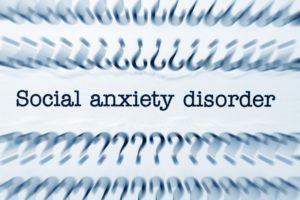 As an anxiety counselor, I know that one of the more common types of anxiety – social anxiety – is a very real disorder that goes beyond descriptors like “shy” and “introverted.” People who have social anxiety have a variety of manifestations of their disorder that usually includes a paralyzing fear of being around and talking to strangers – usually in social situations – and a frustrating feeling of isolation and hopelessness when they’re alone. If you or someone you know suffers from social anxiety, here are 6 things you need to know:
As an anxiety counselor, I know that one of the more common types of anxiety – social anxiety – is a very real disorder that goes beyond descriptors like “shy” and “introverted.” People who have social anxiety have a variety of manifestations of their disorder that usually includes a paralyzing fear of being around and talking to strangers – usually in social situations – and a frustrating feeling of isolation and hopelessness when they’re alone. If you or someone you know suffers from social anxiety, here are 6 things you need to know:
1 – Social Anxiety Is Common
According to the Social Anxiety Association, social anxiety is the third largest mental health care problem in the world and 7 percent of the world’s population is affected by social anxiety at any given time. Most people with social anxiety never seek a diagnosis or the help of a therapist because they don’t know that they have a serious mental health issue that can be treated. For people who do seek help, they often wait until they’ve suffered with social anxiety for many years.
2 – Women Are More Likely To Be Affected Than Men
The Anxiety and Depression Association of America says that from puberty until around age 50, women are twice as likely to suffer from social anxiety than men. One reason for this is the difference in brain chemistry between men and women as the female fight-or-flight response is activated more readily in women and tends to stay active longer than it does in men.
3 – People With Social Anxiety Often Have Other Disorders
Social anxiety often co-exists with other mental health disorders. Alcohol and drug addiction and depression can be triggered by feelings of nervousness, isolation and despair that social anxiety brings with it.
4 – Social Anxiety Can Be Generalized Or Specific
People who only fear one type of social situation, like speaking in front of others, can be said to be suffering from specific social anxiety disorder, while others who fear most every kind of social situation, especially with strangers, can be said to be suffering from generalized social anxiety disorder.
5 – Social Anxiety Disorder Is Caused By Both Genetics And Environment
For people who have a family history of social anxiety disorders, they may never develop the disorder themselves unless there is a specific environmental trigger; conversely, someone who is exposed to a tragic event that could lead to social anxiety disorder may not develop it without a family history.
6 – Social Anxiety Disorder Is Highly-Treatable
The most important thing to know about social anxiety disorder is that it is highly-treatable. With the help of a skilled and experienced anxiety counselor, using therapy, medication or a combination of both, most sufferers will experience a dramatic improvement in their symptoms.
To find out more about social anxiety disorder and to get the help of an experienced anxiety counselor, call Insight Child & Family Counseling at (972) 426-9500 or visit www.j9n.83e.myftpupload.com.

